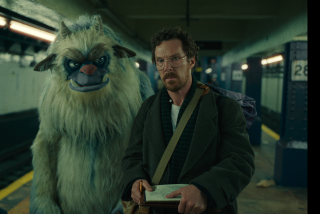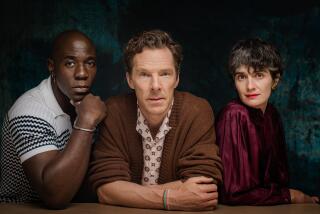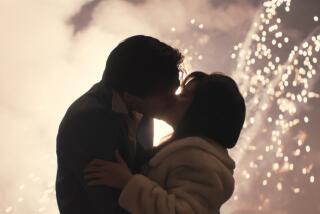His heart’s desires
- Share via
Charlotte Gainsbourg has the droopy, loopy grace of the rock ‘n’ roll princess she is, and her mere presence seems to reduce her husband, French director and otherwise regular Yvan Attal, to a state of antic childishness. In “Happily Ever After,” their second film together, Attal again casts himself as the restless, infantile bumbler to the serene, swan-necked goddess who happens to be his wife.
Married for about a decade, Gabrielle (Gainsbourg) and Vincent (Attal) live cheerfully and harmoniously in a rambling Parisian apartment, and their relationship retains an erotic playfulness that has their crush- prone 6-year-old son, Joseph (played by the couple’s real-life son), on the permanent lookout for a bride of his own. (He has settled, for the time being, on his baby-sitter, Chloe.)
So it’s a shock when Vincent’s love affair with another woman erupts into the story full-fledged. One day it hasn’t yet begun, the next, he’s making out with a tall blond (Angie David) on the threshold of her apartment without so much as a warmup “how do you do?” We never learn how Vincent meets the blond, we never see him make the first move or ponder the consequences of embarking on the affair.
By the time we learn of it, Vincent has already fallen in love with his mistress without falling out of love with his wife. This tension bubbles to the surface of his behavior in bouts of peevishness and petulance as Attal dispenses with showy displays of moral agony entirely. “Happily Ever After” doesn’t care to turn itself into a protection of marriage tract, it just wants to put two people in a difficult situation and watch what they do.
Vincent sells luxury cars for a living but seems to spend most of his daylight hours lunching with his best friends, Fred (Alain Cohen), a mutt-faced Casanova with a string of one-off girlfriends, and Georges (Alain Chabat), whose wife, Nathalie (Emmanuelle Seigner), has launched a full-scale attack on the patriarchy, directed exclusively at his chubby, bewildered person because he’s handiest. The three friends form a loop of grass-is-greener envy: Fred demands to know (rhetorically, it would seem) if he too doesn’t deserve a wife and kids; Georges wonders why the world must be divided in two, with his wife on one side and all the other women in the world on the other; and both marvel at Vincent’s conjugal luck. “She’s great, your wife,” says Fred, his unattached and maddeningly promiscuous friend. “Yeah, she’s great,” Vincent shrugs, annoyed, as if to say, “Rub it in, why don’t you?”
Vincent’s attraction to his mistress isn’t fatal, it isn’t even all that interesting -- if anything, it’s banal, as he himself admits. And yet, despite the absence of a boiled bunny or the accidental killing of a Frenchman by Richard Gere, it’s horrible -- especially for Gabrielle. There are no lipstick traces leading Gabrielle to her discovery, no notes or phone calls, no concerned friends spilling the beans, but she’s as instantly sure of it as she is determined to do nothing until she figures out what she wants.
If this strikes some as some kind of gallingly blase, ostentatious Parisian sophistication, it’s far from it. Gabrielle is devastated, but she’s also thoughtful, practical and empathetic. Before discovering Vincent’s affair, in the movie’s most lyrical scene, she has a silent encounter with a handsome stranger (Johnny Depp) at the Virgin Megastore. Hooked to neighboring headphones playing the same song (“Creep,” Radiohead’s plangent ode to love and inadequacy), the strangers cast furtive, sidelong glances at each other as the tune plays out in its entirety. The camera racks focus from his face to hers, as if shyly glancing back and forth between them, and then pulls up to reveal that this intimate moment has transpired in the full crush of a crowd. It’s a beautiful moment, familiar to any city-dweller whose life has suddenly seemed to take on the emotionally charged quality of a music video, if only for a few minutes.
In a sense, “Happily Ever After,” plays like two concurrent films. The scenes with Vincent and his friends, awash in torrents of compulsive talk laced with doubt, insecurity and confusion, stand out in sharp contrast to the scenes of Gabrielle facing her sadness alone. While showing an empty apartment to a client, she imagines what it would be like to raise her son there alone. Gabrielle is no hapless dependent stuck in a loveless marriage -- she knows she has alternatives, she just doesn’t like the look of any of them.
Like the story, the camerawork in “Happily Ever After” is loose, fluid and intent on discovery; it lets characters’ moments together and alone unfurl easily and casually in a way that Hollywood seems to want to avoid like failure. In one scene, Gabrielle enters a cafe -- shortly after her son has fallen briefly but emphatically in love with a high school girl on the bus, forgetting all about his beloved baby-sitter -- and orders a coffee. The camera follows the waiter back to the bar, and just as you are wondering why, it returns with him to her table, where she is quietly crying. Attal never milks the moment or guns for conflict, nor does he push for a quick resolution.
Neither Gabrielle nor Vincent nor his mistress, we’re meant to understand, is fully in control of the situation, though of the three, only Gabrielle takes steps to save the relationship.
Soon after discovering the affair, Gabrielle takes Joseph on vacation without Vincent. Poolside, she meets an Englishman (Keith Allen), who might have provided her a chance at payback but instead becomes her confidante. The Englishman, who’d had different ideas about how they might spend an evening together, ends up as awed and half in love with Gabrielle as Vincent’s friends. It’s more proof of the film’s genuine curiosity about human behavior. Gabrielle’s shortcomings don’t inspire Vincent’s affair just as her virtues don’t prevent it. And Vincent is neither excused nor villainized. That’s because “Happily Ever After” is concerned with the unsolvable mysteries of marriage, with the way it refracts different meanings from different angles.
In one scene, Vincent makes last-minute plans to go out and play cards; Gabrielle is annoyed at the prospect of being left at home. “I could have called Chloe and made plans myself,” she says, but you know that’s not it at all. It’s much harder to define, but it has to do with the difficulty of balancing your individuality with your identity as part of a couple. The resolution is so familiar it’s reassuring: Vincent offers to stay, Gabrielle settles for the offer and tells him to go. By the time he’s finished dinner and is headed for the door, all their tension has dissipated.
Toward the end of the movie, Vincent’s parents (played by Claude Berri and Anouk Aimee) eat a wordless dinner together at a restaurant. They’ve been married 40 years -- as long as Fred claims it will take for the entire, doomed institution to disappear. Whether the scene is taken as proof of Fred’s theory (they have nothing left to say to each other) or a testament to Gabrielle’s faith in monogamous love will depend entirely on the viewer. And will no doubt be subject to change.
*
‘Happily Ever After’
MPAA rating: Not rated
Times guidelines: Some nudity and sex scenes, adult themes
Released by Kino International. Director Yvan Attal. Producer Claude Berri. Executive producer Pierre Grunstein. Screenplay by Yvan Attal. Director of photography Remy Chevrin. Editor Jennifer Auge. Art director Katia Wiszkop. Running time: 1 hour and 40 minutes. In limited release.
More to Read
Only good movies
Get the Indie Focus newsletter, Mark Olsen's weekly guide to the world of cinema.
You may occasionally receive promotional content from the Los Angeles Times.










